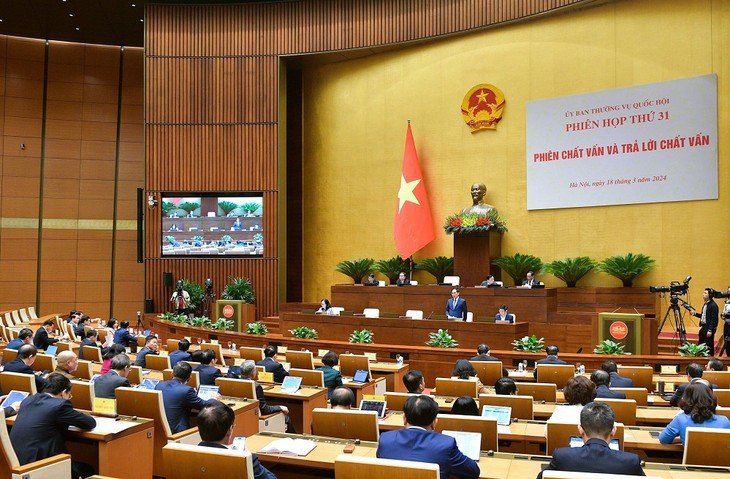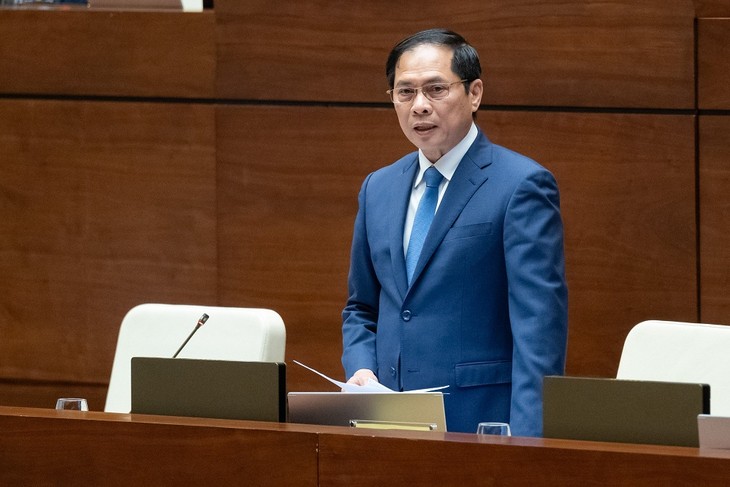(VOVWORLD) - At the 31st session of the National Assembly Standing Committee on Monday, Foreign Minister Bui Thanh Son answered deputies’ questions on the implementation of bilateral and multilateral agreements, solutions to take advantage of economic, trade, and investment cooperation agreements, activities to expand export markets, and support for Vietnamese businesses investing abroad.
 The Q&A session on diplomacy at the 31st session of the National Assembly Standing Committee (photo: quochoi.vn) The Q&A session on diplomacy at the 31st session of the National Assembly Standing Committee (photo: quochoi.vn) |
Minister Son said that, since the 13th National Party Congress in 2021, Vietnam has negotiated and signed 5 bilateral or multilateral Free Trade Agreements, bringing the number of FTAs negotiated and signed to 19. 16 FTAs have come into effect, with 60 partners on every continent who account for a major part of global GDP, making Vietnam one of the countries that have joined the most FTAs in the region.
So far 72 countries and territories have recognized Vietnam's market economy status. The UK recognized Vietnam’s market economy status in 2023 and consideration of this matter is included in the Joint Statement on Establishing the Vietnam-US Comprehensive Strategic Partnership.
This is a good foundation for Vietnam to promote trade cooperation with partners who will open their markets and reduce or remove trade barriers for Vietnamese goods to enter their supply chains.
 Foreign Minister Bui Thanh Son answers questions at the 31st session of the National Assembly Standing Committee on March 19, 2024. (photo: quochoi.vn) Foreign Minister Bui Thanh Son answers questions at the 31st session of the National Assembly Standing Committee on March 19, 2024. (photo: quochoi.vn) |
Enhancing coordination to promote exports, connect businesses
Implementing the Party's guidelines on building economic diplomacy to serve national development, the Ministry of Foreign Affairs and Vietnamese representative agencies abroad have closely coordinated with the Ministry of Industry and Trade, other ministries, localities, and businesses to expand export markets and border trade with neighboring countries.
Minister Son said: “We have connected by roads with China and will continue to build railways to trade with other partners. We’ll negotiate with partners on export regulations and goods standards, which will be good for Vietnam’s sustainable, long-term socio-economic development.”
With exports of garments and footwear products to European markets facing many difficulties, Vietnam has been seeking new markets and marketing new products, focusing on agricultural and forestry products. Minister Son said the Ministry of Foreign Affairs has directed ambassadors to expand export markets, especially the high-potential Middle East and African markets.
“We have coordinated with other ministries in a number of missions. First, we have directed diplomatic agencies to continue helping provinces, cities, and businesses participate in trade, investment, and tourism promotion activities and bring their products to the Middle East, Africa and Gulf regions. Second, we have continued to support the export of Vietnamese staples, including wood products to the Middle East and African markets. We have also called for investment in the Middle East in logistics, infrastructure, and renewable energy,” said Son.
Mr. Son said the ministry will develop regulations on certification of Halal products, promote international cooperation in the Halal industry, and help connect Vietnamese businesses and localities with Halal markets.
Strengthening economic diplomacy
Major markets have imposed new import standards related to the product origin, the supply chain, clean materials, environmental protection, labor practices, and management. The Ministry of Foreign Affairs believes economic diplomacy must be further promoted.
In addition to advising the Government to promote cooperation frameworks with partners, the diplomatic sector has coordinated with other sectors to negotiate and sign new generation FTAs that ensure national interests.
The Ministry has directed overseas agencies and trade offices to monitor the markets and new policies of their host country and issue early warnings of risks, technical barriers, and potential trade disputes to help the Government, agencies, localities, and businesses promptly adjust policies to protect interests of businesses and people.